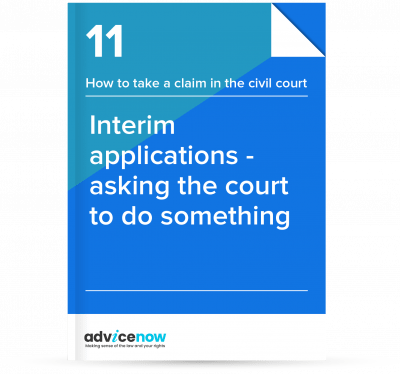
Introduction
This guide is for you if you:
- are involved in a civil claim in England or Wales, and
- your case involves a claim for £25,000 or less, and
- you are representing yourself (you are a litigant in person) and not eligible to have your case paid for by legal aid, a trade union, or insurance.
Top tip – Have a look at An overview of the process of taking a claim in the civil court to get an overview of what a typical case might look like and How to take a claim in the civil court - at a glance.
This guide is also for people supporting litigants in person, for example Support Through Court volunteers, Citizens Advice volunteers, housing support workers, advice workers and court staff, as well as relatives and friends.
This guide is not for you if you are involved in:
- a criminal case,
- a family case (such as an application for a domestic violence injunction or a divorce),
- a housing disrepair or housing possession case including mortgage possession,
- an injunction (including court claims about anti-social behaviour)
- a medical accident case,
- a case involving defamation (that is libel or slander) or
- a tribunal case (such as a discrimination or employment case).
The rest of this series about sorting out a dispute and going to a civil court can be found on our Going to a civil court page.
Legal language
We try to explain any legal language as we go along, but there is also a ‘What does it mean?’ section at the end.
February 2024
What is an interim application?
An application is how you ask a court to do something or authorise something. An interim application is one made at any time after you start your claim and before the trial. You may need to make an interim application if you need to
- amend your claim, or
- rely on witness or expert evidence which has not already been authorised by the court, or
- if you want the court to make the other side do something, such as show you copies of documents which they are refusing to disclose.
Although an interim application may be necessary in some circumstances, the courts encourage parties to sort out interim problems without going back to the court to resolve them if you can. The high level of the current court fee also encourages parties to find alternative solutions.
Be aware!
The court fee for making most types of interim application is currently over £250 so it is better to avoid having to do this if you possibly can.
It’s fine to contact the other party or their solicitor (if they have one) outside of the court process. So, you should try informal pressure, for example, phoning or emailing them to explain what the problem is and your suggested solution. If you phone them, follow this up with a letter. Keep a record of every attempt you make to contact the other side in your efforts to resolve any interim problem. If you end up having to go to court the court will want to know this information.
If you or the other side can't comply with the timetable of the order for directions, (for example, because you need more time to prepare your list of expert evidence) the best thing to do is to try to agree a change in the timetable between you, before the relevant deadline has passed. The different sides are generally allowed to agree to extend deadlines for case management steps by up to 28 days, as long as this does not put at risk any hearing date. If you can do this, there is no need to apply for an interim order and you don’t need to tell the court about the new arrangement.
However, if you want to change the date for providing the pre-trial checklist to the court, or you want a new trial date or trial window, you do have to apply to the court, even if you both agree.
There may be circumstances where applying for an interim order is unavoidable, for example, if you realise you have made a serious mistake in your claim form or particulars of claim. Even then, the other side may agree to the changes you want to make. If they do, you can apply for a consent order which will make things easier, because the court probably won’t need a hearing before they make a decision.
'Applications by consent' (applications all sides agree to) require a much smaller fee.
If you are thinking about applying to postpone the hearing date, bear in mind that once a court has fixed a trial date, it prefers not to change it if at all possible as this is a waste of resources. So, the court may not agree to a postponement even if both of you want it. The court won’t allow a postponement because of a failure to comply with the order for directions, except in the most exceptional circumstances. If you apply to postpone, you will need to give very good reasons. 'I am scheduled to have an operation four weeks before trial and been told I will need six weeks bedrest’ (with a copy of the notification from the hospital attached) may get you a postponement. 'Not enough time to prepare' won't.
The only time there isn’t a fee for an interim application is when the claimant and the defendant agree to apply to the court to postpone the trial date and the court receives their consent application at least 14 days before the date of the hearing.
How do you make an interim application?
 You usually have to do this in writing using the N244 form (an ‘Application Notice’) in the Forms and rules section below. You don’t need to write your application using legal language; plain English will do very well.
You usually have to do this in writing using the N244 form (an ‘Application Notice’) in the Forms and rules section below. You don’t need to write your application using legal language; plain English will do very well.The side making the application usually has to pay a court fee. The amount varies depending on what type of application you make, but for most applications made during a case the fee will be over £250 unless the other side agrees to whatever you are asking the court for (in which case it is an “interim application by consent” and a smaller fee will apply). You can find information about court fees in Form EX50 (including Welsh language and large print versions).
There are always cost consequences to making an interim application. If you make one and lose it you will almost always be ordered to pay the other side's costs, even if you win the case as a whole. So before applying, see if you can get the other side to agree to what you want. That way, you may not need an order at all. If an order is made but with the other side's agreement then usually either
(1) you will only have to pay your own legal costs and not theirs as well, or
(2) you will have to pay their costs but they will be much lower because less time will have been taken up dealing with the application.
You can find a table setting out the different costs orders commonly made in proceedings before trial and their effect in rule 4.2 of the General Rules about Costs.
Forms and rules The form to use for making an interim application (N244) can be found on the GOV.UK. You can find Welsh language and large print versions of this form together with notes for guidance to help you fill it in by following the same link. You can find the general rules about applications for court orders and additional guidance |
What does it mean?
Contempt of court - this is showing disrespect to the court, perhaps by lying or not following the judge's orders. It is punishable by a fine or even time in prison.
Disclose - showing relevant evidence to the other party.
Interim application – an application made at any time after you start your claim and before the trial.
About this guide
Disclaimer
The information in this guide applies to England and Wales only. The law may be different if you live in Scotland or Northern Ireland. The law is complicated. We have simplified things in this guide. Please don’t rely on this guide as a complete statement of the law. We recommend you try and get advice from the sources we have suggested.
The cases we refer to are not always real but show a typical situation. We have included them to help you think about how to deal with your own situation.
Acknowledgements
This guide was produced by Law for Life's Advicenow project with additional material from Laura Bee. We would like to thank everybody who commented on the guide including editorial teams at Thomson Reuters who kindly peer reviewed this updated version.

Thanks to the Bar Standards Board for funding the creation of this guide. Thanks to the Ministry of Justice for funding this update.
February 2024
